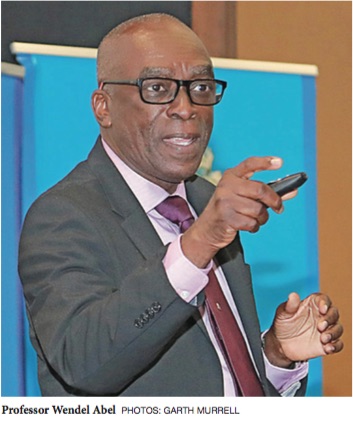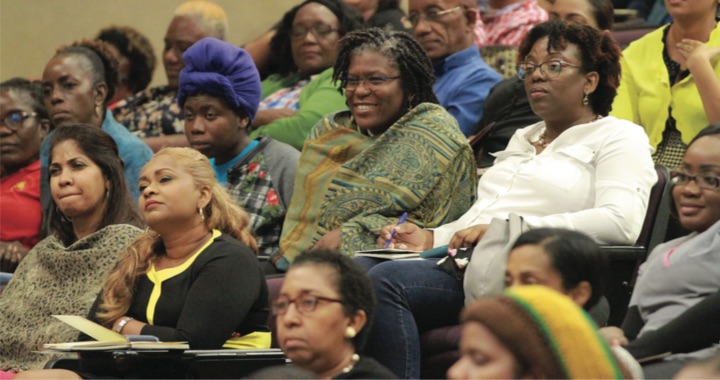
IAs we learn more about the human brain and mental health, we are making more connections between facilitating mental health care from a young age, and creating a brighter future for Trinidad and Tobago, the Caribbean and the world as a whole.
Professor Wendel Abel, Professor of Mental Health Policy and Head of the Department of Community Health and Psychiatry at The UWI Mona Campus, has dedicated much of his life to dealing with a range of mental health issues. On September 27 he held a lecture titled “Making a Difference in Education: Tackling Mental Health Issues” at The UWI St Augustine Campus. The occasion was the 2019 UWI-Guardian Group Premium Open Lecture.
According to Professor Abel’s research, one in four persons will struggle with a mental health disorder during their lifetime. But many of them will not get the support they need. Professor Abel is hoping to change this by educating the region on mental health issues and fighting the stigma against mental illness that so often stops people from getting help — as well as working on the structural issues that can hinder the average person’s access to care.
In his packed lecture at Daaga Auditorium, Professor Abel particularly focused on the mental health of the younger generation, who are at risk of not getting the help they need to combat issues like stress, depression and the effects of early life trauma. In Trinidad and Tobago, suicide rates are highest in males aged 25-34 and females ages 15- 24. This is something that Professor Abel thinks we can change— but first it starts with changing our perspective on issues like addiction and trauma.
In his lecture, Professor Abel outlines the importance on the first thousand days in a child’s life, and how it can affect the person they will grow up to be. Children who feel safe and stable, and who have a wealth of positive experiences with their parents and those around them, have a greater chance of becoming well-adjusted adults.
He referenced an adverse childhood experience (ACE) study that found that 59 per cent of adults were exposed to an ACE, and this affected their ability to learn, to control their emotions and impulses, and to succeed academically. It even meant a higher likelihood for lifestyle diseases like obesity, high blood pressure and high cholesterol. So how can we as a society, and our academic institutions, support people who are at higher risk for mental health issues because of their environments or genetic predispositions?
Professor Abel pinpoints early education as the ideal tool for youth intervention. Instead of focusing solely on academic achievement, he suggests that our education system needs to pivot more to a holistic approach to learning that also nurtures the mental well-being of our children. A simple act like making a child feel that they have a voice and a sense of agency can have a great impact on their life— instead of punitive responses. All research points to positive outcomes when parents and teachers reinforce kindness, patience, acceptance and a non-judgmental approach to children’s behavior.

It can be difficult to break the cycle of a negative home environment. Many who grow up in unstable or unsafe homes often pick up the same behaviours, and this creates a cycle of generational trauma. But Professor Abel and others like him are working to give individuals the support they need to break these cycles and raise a new generation with love and understanding rather than humiliation, violence and fear. This can do wonders for a child’s self-esteem, coping skills and mental health on a whole.
In his lecture, Professor Abel outlines the importance on the first thousand days in a child’s life, and how it can affect the person they will grow up to be. Children who feel safe and stable, and who have a wealth of positive experiences with their parents and those around them, have a greater chance of becoming well-adjusted adults. Those who live in an environment of chronic stress, violence and instability have been found to finish fewer grades in school, earn less and have poorer health.But parents cannot do it alone— as Professor Abel notes, “it takes a village to raise a child”. He notes that it is vital to focus on parenting education, and invest in early childhood education to give both parents and children the tools they need to deal with this early stage of life and development. In schools, there needs to be a push to increase awareness of mental health issues, reduce stigma and discrimination, and foster an environment of acceptance and safety where children can feel heard and understood.
As Samanta Saugh, Vice President of Finance for Guardian Life of the Caribbean said in her address at the lecture, “It is critical that all strata of society and persons sitting at various levels of our organisations become more sensitised to this issue and are able to interact with individuals suffering from mental health illnesses to bring the balance that is so needed for us to function cohesively.”
To deal with such a widespread issue, there needs to be an entire culture shift in how we treat our children, how we treat each other, and even how we treat ourselves. Our future may depend on it.
Held every two years, The UWI-Guardian Group Premium Open Lecture Series is an initiative of UWI’s Centre for Excellence in Teaching and Learning (CETL) in partnership with the Guardian Group. The series hosts internationally renowned educators to present on learning and teaching in higher education. The UWI-Guardian Group Premium Teaching Awards was also established through the partnership.